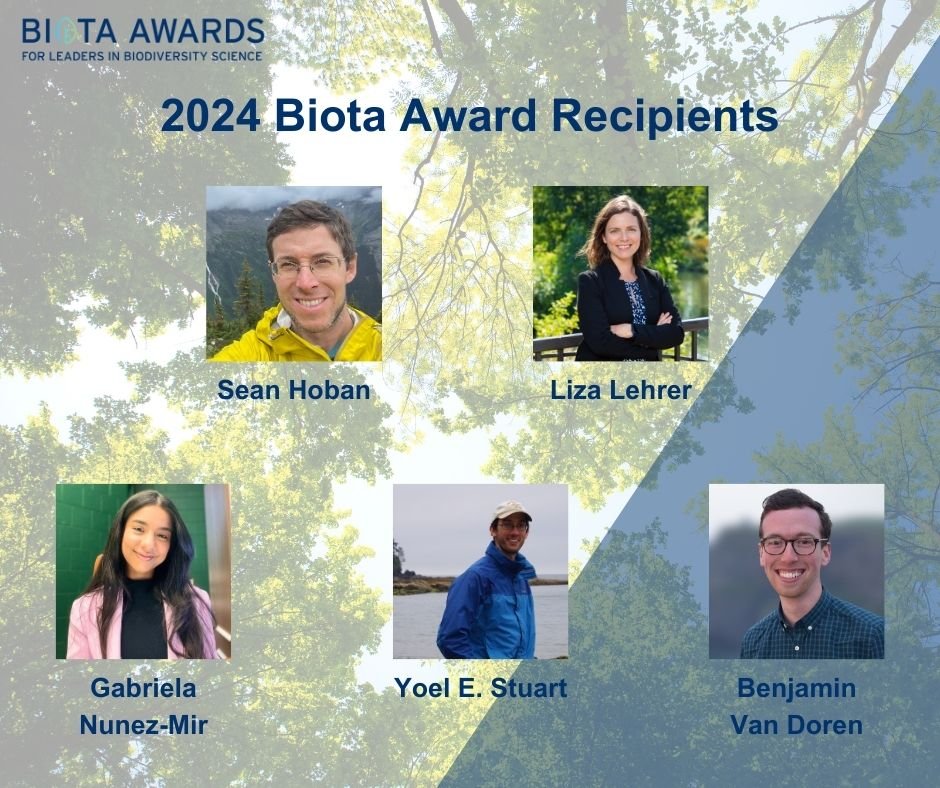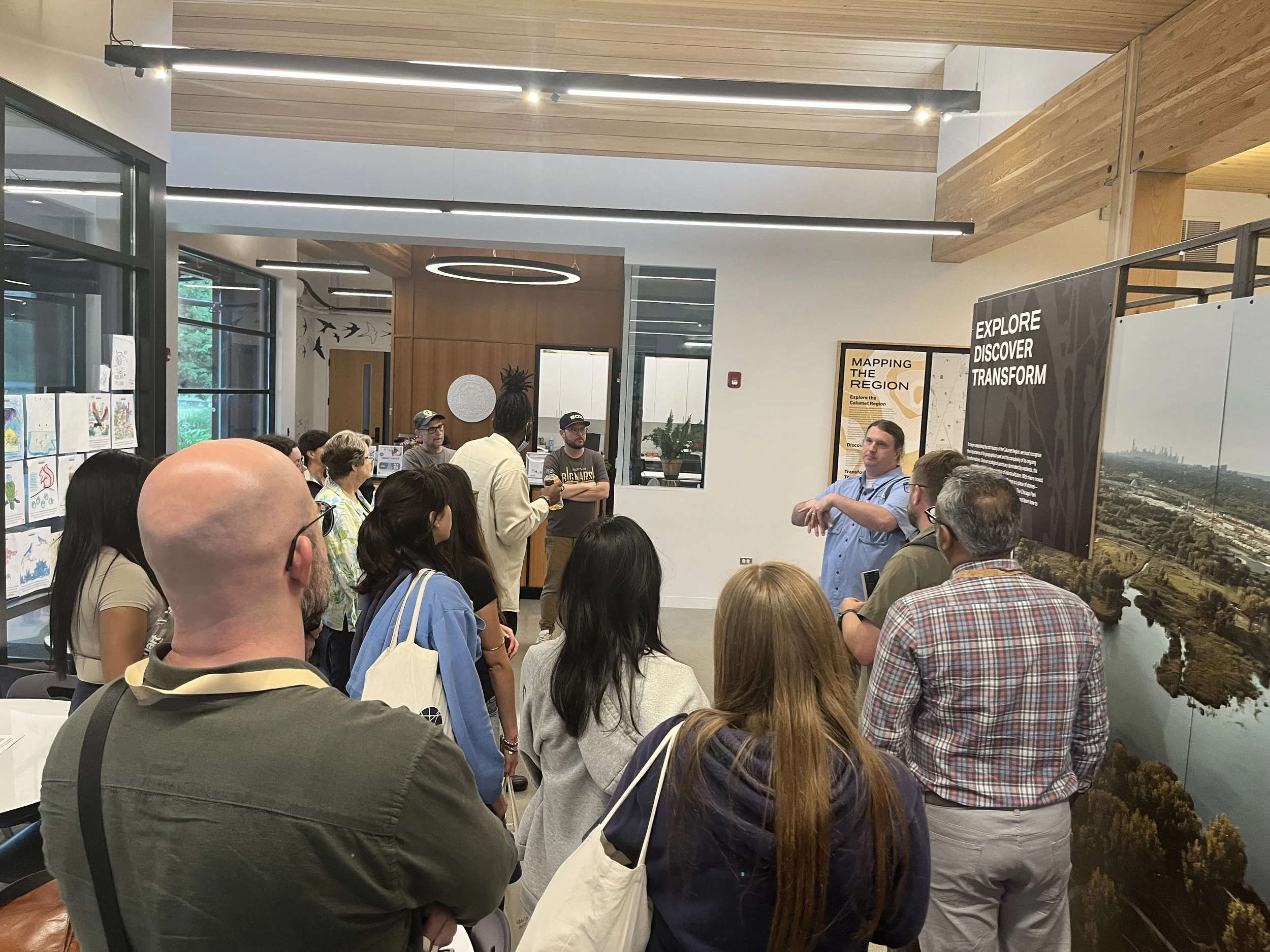Meet the 2024 Biota Awardees
Researchers based in the Chicago region seek to restore, protect and conserve biodiversity locally and around the world
Chicago is a densely populated city surrounded by diverse and rare ecosystems, including remnant prairie, wetlands, and one of the largest bodies of freshwater. While threats to biodiversity in our region are vast, the potential solutions are just as expansive. Researchers in Chicago are uniquely positioned to understand how humans and nature can thrive.
Walder Foundation promotes the long-term sustainability of the natural environment by addressing socio-environmental challenges such as climate, water, food, and health. Through the Biota Awards, the Foundation aims to explore new solutions to restore and preserve our ecosystems.
2024 Biota Awardees
Sean Hoban, Ph.D.
Sean Hoban, Ph.D.
Tree Conservation Biologist, The Morton Arboretum
Sean Hoban is a Tree Conservation Biologist at The Morton Arboretum. His research focuses on developing science-based advice and novel approaches for conserving threatened species and their capacity to adapt to changing environments. He has contributed expertise and advice to national and global policymakers on genetic diversity and species recovery, while also helping botanic gardens more effectively and efficiently safeguard threatened trees.
He regularly works with organizations like the Center for Plant Conservation, BGCI, US Forest Service, and US Fish and Wildlife Service. He has published 90 scientific papers, holds positions at The Field Museum and University of Chicago, and values mentorship and equity in STEM.
PROJECT SUMMARY
Preserving Genetic Diversity in Trees: Integrating an Affordable, Rapid Approach With Action and Policy
Genetic diversity is vital for nature and society. It helps species adapt to environmental change. However, assessing genetic diversity with DNA sequencing is expensive, slow, and technically challenging - a major gap in biodiversity science. With a global team, I developed an innovative, cost effective, accessible, and inclusive solution to this problem: “genetic diversity indicators,” which assess genetic status using simple data like population sizes. This Biota project will apply genetic indicators to 200 tree species, create useful toolboxes to scale this approach, and implement genetics-informed action for a highly threatened tree in the Chicago region. Key partners will help ensure on the ground outcomes for policy and action.
Liza Lehrer, M.S.
Liza Lehrer, M.S.
Assistant Director, Lincoln Park Zoo’s Urban Wildlife Institute
Liza is the Assistant Director at Lincoln Park Zoo’s Urban Wildlife Institute. Her research focuses on understanding the drivers that influence what and how wildlife species live in cities, toward creating cities as places where wildlife can thrive. Her interests include identifying collaborative solutions to reducing negative human-wildlife interactions and connecting people to the biodiversity that surrounds them.
Liza earned a B.S. in Zoology from Washington University in St. Louis and completed a M.S. in Wildlife Ecology from the Department of Natural Resources and Environmental Sciences at the University of Illinois.
PROJECT SUMMARY
BatTracker: Community-Driven Research to Monitor Bats and Connect Chicago Residents to Nature
Cities can be places where wildlife can thrive when they are designed with supportive habitat. The BatTracker program is a volunteer-led community science program that trains volunteers to contribute to conservation research by recording bat echolocation data in Chicago’s green spaces. Through this work, Liza will collaborate with partners to expand data collection and environmental education programs to more communities. Through paid summer field research experiences, local teens will identify what features of the landscape best support bats. This work will connect more people to urban nature and will provide science-based recommendations for creating bat-friendly habitat in Chicago’s green spaces.
lpzoo.org/experts/liza-watson-lehrer
lpzoo.org/conservation-science/science-centers/urban-wildlife-institute
Gabriela Nunez-Mir, Ph.D.
Gabriela Nunez-Mir, Ph.D.
Assistant Professor, University of Illinois Chicago’s MEC Lab
Gabriela is a quantitative ecologist and a third-generation conservationist from the Dominican Republic. Growing up in a Caribbean island with high levels of endemism, Gabriela has always been very aware of the destructive impacts of invasive species. Today, her research program leverages large bodies of ecological data to investigate the dynamics of biological invasions at regional to continental scales.
Prior to becoming faculty, Gabriela joined UIC in 2021 as a Bridge to the Faculty Scholar. Before that, she was a Postdoctoral Fellow at Virginia Commonwealth University, studying the range dynamics of a high-profile invasive insect. In 2018, she obtained her Ph.D. from the Department of Forestry and Natural Resources at Purdue University.
PROJECT SUMMARY
America's Next Top Invaders: Forecasting invasive range size of invasive plants using a traits-based framework
Prevention of biological invasions is crucial, as eradication of established invasive species is generally unfeasible. Identifying potentially invasive species and their impacts is an important aspect of early detection and rapid response, an important prevention strategy. A promising approach to identifying potential invasives hinges on evaluating the relationship between species traits and invasion success. To achieve this, Gabriela will compile a comprehensive traits database for ~900 non-native plant species in the U.S. to evaluate these traits as predictors for invasion success. This work will produce a watchlist of potentially invasive plants that will support invasive policy and management in the state of Illinois and nationwide.
Yoel E Stuart, Ph.D.
Yoel E Stuart, Ph.D.
Associate Professor, Loyola University Chicago’s Department of Biology
Yoel is an evolutionary ecologist that studies the speed and repeatability of evolutionary change. He was trained at the University of California Davis, Harvard University, and the University of Texas at Austin. His research investigates interactions between native and invasive species of lizards in Florida; the extent to which lake and stream adaptation by Vancouver Island stickleback fish is predictable;
whether nuclear radiation impacted populations of small freshwater crustaceans in Utah; and the timing and manner of change during 20,000 years of evolution in a fossilized stickleback population. At Loyola University Chicago, he teaches Ecology, Evolution, and a course-based undergraduate research laboratory in evolutionary biology.
PROJECT SUMMARY
Building a Mitochondrial Genome Database of Illinois Fish to Enhance eDNA Surveys to Improve Conservation Outcomes
Conservationists need to know what species are where and when, but such data are hard to get, especially for rare, endangered, or invasive species. A solution may be environmental DNA (eDNA). Organisms release DNA via shed skin, hair, scales, and feces. We can collect and sequence this eDNA to match it against reference sequences, like fingerprint matching. Because eDNA helps us detect species without having to catch them, it is potentially a powerful conservation tool. To realize this potential, we need complete reference databases, which are lacking. This project will build an eDNA reference database for all Illinois fishes, facilitating rapid, accurate surveys. We will use this database to survey fish diversity in Illinois’s Fox River.
Weston Testo, Ph.D.
Benjamin Van Doren, Ph.D.
Assistant Professor, University of Illinois Urbana-Champaign’s Department of Natural Resources and Environmental Sciences
Dr. Benjamin Van Doren studies how migratory animals are responding to a changing world. He is an Assistant Professor in the Department of Natural Resources and Environmental Sciences at the University of Illinois at Urbana-Champaign. His research spans spatial and population scales and unites ecology, evolution, behavior, and conservation.
Dr. Van Doren earned a PhD in Zoology from Oxford University and has received achievement awards from the American Ornithological Society, Linnean Society of London, and Zoological Society of London.
PROJECT SUMMARY
Wings Over the Windy City: Science, Outreach, and Action to Protect Chicago's Migratory Birds
Migratory animals have experienced dramatic population declines in recent decades, and human activities and the built environment are an important cause. In this project, we will study the risks migratory birds face in Chicagoland—both on the ground and in the air. We will (1) show how migratory birds use aerial habitats high above the city, (2) characterize the value of urban green spaces, and (3) identify the most important factors driving fatal bird-building collisions. Armed with this new understanding, we will develop data-driven tools for use by advocates and policymakers and engage and educate the public about the inspiring phenomenon of bird migration and what they can do to help.
Get more stories like this delivered to your inbox.
Sign up with your email address to receive news and updates.
















